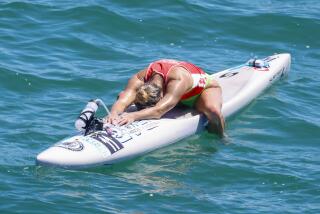Old World-New World Event : Expatriate Philadelphian Salutes U.S. Constitution With a Yacht Race
ABOARD THE YACHT PHILADELPHIA — Skipper John Kalish picked up a rope lying on the deck and absent-mindedly coiled it until he noticed what he was doing and stopped.
“You know, there was a time there when I wondered if I would ever touch dry rope again,” he said to no one in particular.
A smile played at the corners of his mouth as his eyes went to the prow of the 42-foot Philadelphia where, just days before, 35-foot waves had tossed his command while a North Atlantic storm howled in the rigging.
Kalish pushed his hair back under his A’s baseball cap as he remembered the water surging over the deck, the wait to see if the boat had withstood the pounding.
“We never stopped sailing. We had the sails reefed down, but we never stopped,” said Kalish, an American living in Europe who organized the Constitution transatlantic yacht race as a way of celebrating the 200th anniversary of the U.S. Constitution.
The son of a Hungarian immigrant, Kalish, 47, was born and raised in Philadelphia. After graduation from Lehigh University in 1963, he settled in Brussels as a publisher and general manager for a U.S.-based publisher. Today, he works as a consultant.
American ‘Good Deal’
“But, you know, the more time I spend in other countries, the more I find cause to reflect on how good a deal we Americans have,” Kalish said. “Nowhere do people quite have the rights, the freedoms and the expectations we do.”
When Kalish heard about the constitutional bicentennial, he read the document again and decided to do something to join in the celebration. He also wanted to recognize the contributions of his home city, which he says are not familiar to Europeans.
Why not an Old World-to-New World sailboat race? he thought.
As the Constitution transatlantic race became reality, he fought to keep it amateurs only.
“There were no million-dollar, specially-built boats out there, and there was no big corporate sponsor,” he said. “That isn’t the spirit of the Constitution. The spirit of the Constitution is people.”
Race rules allowed each entry to accept donations to offset expenses, estimated at $70,000 to $100,000.
Kalish was 33 when his first sail took him into the teeth of an ocean storm. A friend had invited him along.
Thrill of First Storm
He and the friend rode out the storm in the cockpit while the rest of the crew was seasick in their berths. It was frightening but also challenging, and Kalish vowed that if he woke the next day as a survivor he would buy a boat and master sailing.
“Well, I did wake up and I did buy a boat,” he said, referring to his own 27-footer. The Philadelphia was leased for the race.
Kalish had sailed the British Isles, across the English Channel, even across the Atlantic, but not the North Atlantic.
He said the race also commemorated the Treaty of Rome, 30 years old this year, which initially bound together six countries in an economic union--West Germany, France, Luxembourg, Belgium, Holland and Italy.
“The Europeans are trying to create, out of independent states, a practical union,” Kalish said, drawing a parallel with the 13 American colonies.
Besides the Philadelphia, other boats in the race represented Luxembourg, Portugal, Greece and the European Common Market.
Third-Place Finish
The Letzebeurg of Luxembourg finished first on June 9; the Europe came in second on June 10; Philadelphia placed third on June 12 and the Portugal was right behind on June 12. The Hellas, from Greece, came in fifth on June 13.
But Kalish nearly didn’t finish.
Forty minutes into the 3,000-mile race, which began May 16, a spectator craft edged too close, wrote Paul B. Carroll, a Wall Street Journal reporter who was one of the crew of five.
“There is a sickening crunch as a collision punches a hole above the first ‘L’ in the Philadelphia insignia,” Carroll wrote. “Capt. Kalish pours forth an appropriately salty stream of mariner’s expletives, then says with a sigh: ‘Well, boys, I think that’s it for us.’ ”
Crewman Bill Tattersall said spirits were low after the accident. “I had expected a lot of work, even though I had never sailed before this, but I wasn’t ready for an early finish,” he said.
A repair crew managed to patch the hole in 10 hours, and Kalish set sail once more.
Then a week of unusually light winds was followed by two storms, one of which left Tattersall wondering if he was going to make it back to school in Brussels.
Wall of Water
“What was really scary was at night, when you saw that wall of water coming at you and you asked yourself if it was going to break right over you or drop you straight down on the other side,” said Tattersall.
“You were soaked through, but that wasn’t all of it. Then you went below and you crawled into a wet sleeping bag. You had no dry clothes. Everything was wet,” he said.
“But we made it through alive and, yes, I would do it again.”
Kalish wasn’t surprised by Tattersall’s readiness to go again.
“Isn’t that what this is really all about? People willing to face a difficult situation and work together for the common good?
“I wouldn’t be here today if, 200 years ago, another group of people in Philadelphia hadn’t been willing to take on the impossible.”
More to Read
Sign up for Essential California
The most important California stories and recommendations in your inbox every morning.
You may occasionally receive promotional content from the Los Angeles Times.










